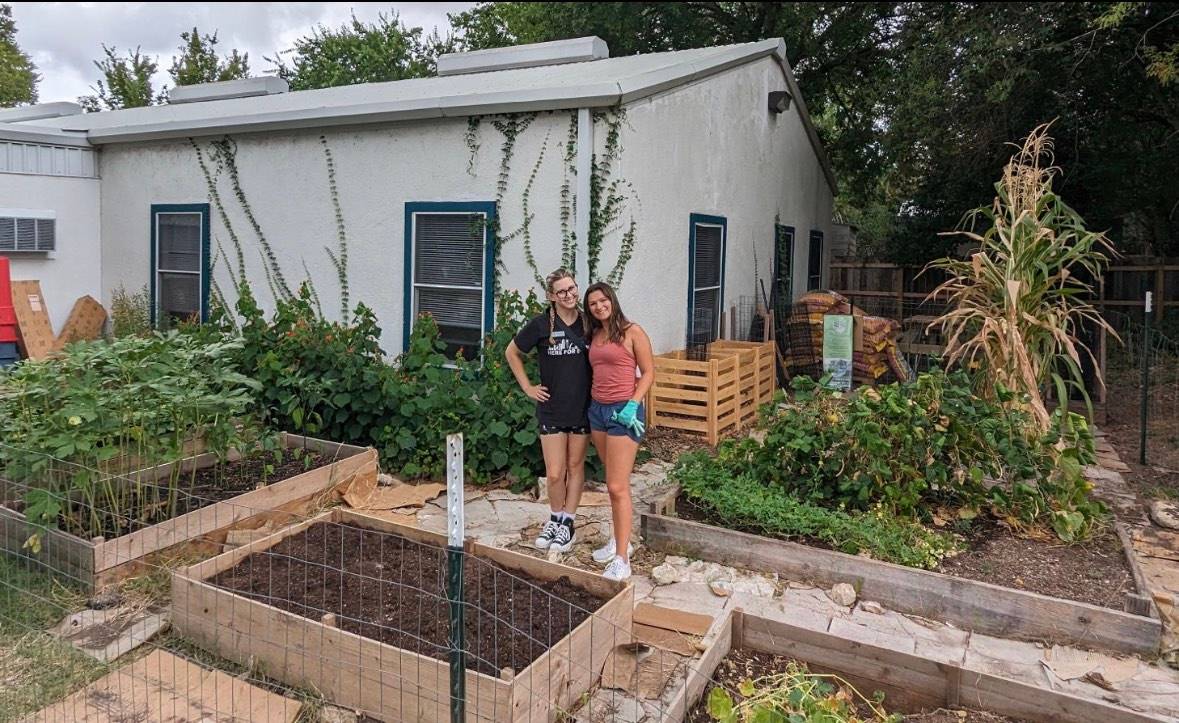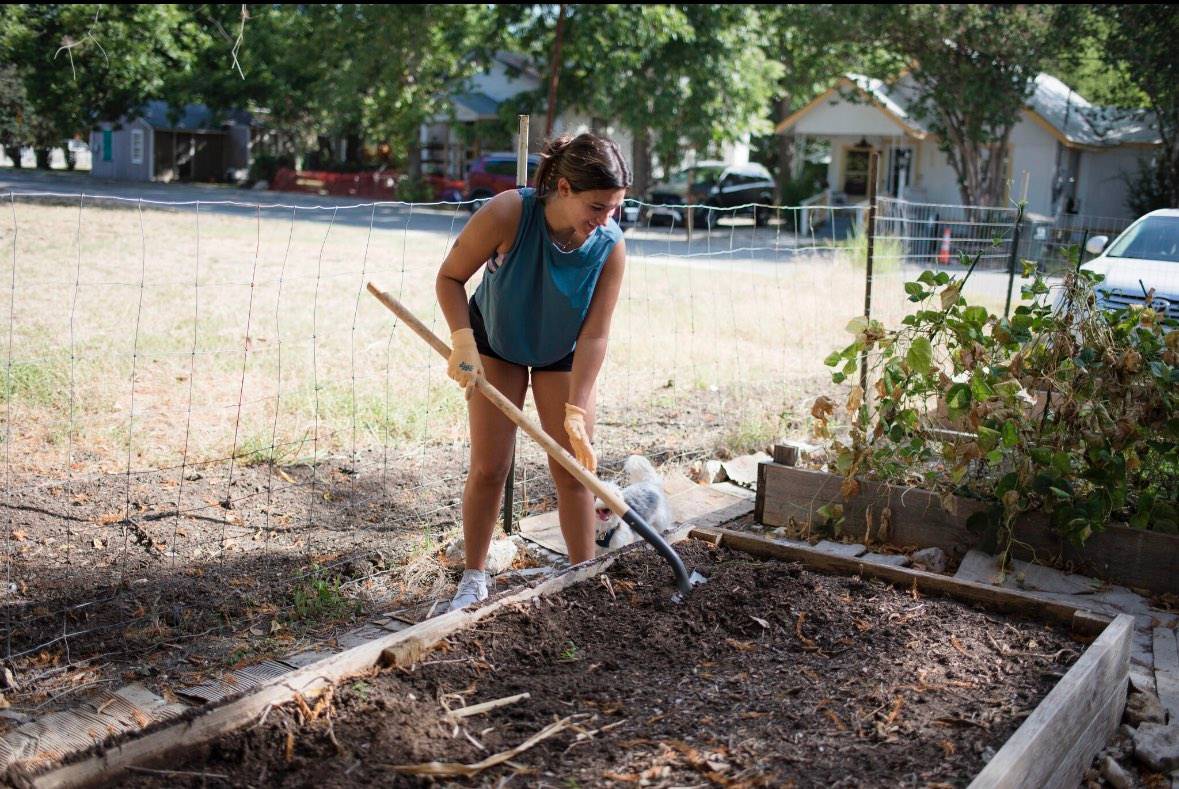Lane Fortenberry | October 23, 2023


Food sustainability stays top of mind for many communities, especially those experiencing drought, floods, wildfires, and other climate-related disasters. While considering alternate futures and strategies for a resilient local and regional food system in Central Texas, several Stelos Scholars students presented ideas at a summer 2022 workshop.
One of the students who attended the workshop was Madelyn Parsons, a junior criminal justice major and forensic psychology minor. Through the workshop, Parsons’ passion grew about the way people are affected by their food intake and where it’s sourced.
Her summer project group proposed a new app, Sustainable Connections, to simplify business partnerships between local food suppliers, restaurants, and businesses.
“With Stelos, we’re a group of like-minded individuals who motivate each other, are supportive of one another, and are all driving toward the same goal,” Parsons said. “We’re looking to learn and grow together, and I think that was apparent through the workshop.”
Once the workshop was over, food sustainability was still on her mind, though.
Parsons mentioned her desire to continue working on a project related to food resources in passing to Claudia Roeschmann, Stelos Scholars co-director and professor in the School of Art and Design.
Roeschmann took that passion to heart. Through a Connected Infrastructure for Education, Demonstration, and Applied Research (CIEDAR) Consortium connection, she applied for the World YMCA Youth-Led Solutions: Climate Action grant through the Greater Austin YMCA.
The grant was quickly accepted, and a new partnership was born with the Hays County Food Bank to create a sustainable community garden to add fresh produce for its routine food distributions.
“We knew we wanted the grant as soon as we found out about it, so we put every effort forward to make it happen in a very short turnaround time,” Roeschmann said. “We had all these new connections through the workshop, so this just felt like the next logical step. The process was really beautiful to see.”
The idea of the sustainable community garden is to build upon the garden initiatives already established at the Hays County Food Bank. This would take the support of sustainable food sourcing to the next level for the San Marcos community.
“I grew up in a household where there was always an emphasis on healthy living, healthy food, and appreciating where your food comes from,” Parsons said. “Because of that, I really connected with the workshop and wanted to make those ideas a reality.”
Once the grant was received in April 2023, Parsons and Roeschmann used May to create a plan of what they hoped to achieve by the end of the grant cycle in November. This included formulating the budget, making additional connections, and purchasing equipment and supplies.
Wasting no time, they dug their hands in the dirt and started designing the garden as the summer heat arrived.
Parsons spent the early summer mornings adding three new raised beds, changing out soil, incorporating a new 232-gallon composter, and planting produce and assessing growth rates for the fall harvest, which will happen in November. She’s also in the process of implementing a new watering system for the garden.
The garden was also expanded to add a corner herb garden and a greenhouse for seed sprouts during colder months and for plants that require more moisture during warmer months.
When the heat became unbearable, Parsons would get back to planning how to improve the garden or what should come next after November. While taking breaks from hands-on work, the team participated in community involvement and outreach.
October will be spent mulching, gathering ecological supports, transferring the plants in the greenhouse to raised beds, collecting water, and beginning to harvest.
As harvest season gets closer, more students from the Stelos Scholars cohort will join her in tending to the upkeep of the garden, planting more produce, and watering, which Parsons said, “takes a lot longer than you think it does.”
Once the produce is harvested, the hope is that it will be implemented in the food bank’s drop-off service in various locations in the community. Each family typically receives one bag of fresh produce and one bag of nonperishables.
Roeschmann points to the sustainable community garden as the perfect example of what her and other faculty leaders are aiming to achieve with the Stelos Scholars program.
“Stelos’ intention is to bring students together from cross-disciplinary backgrounds to introduce them to leadership projects to build community and make a long-lasting impression,” Roeschmann said. “Having the university, the YMCA, and the food bank partner together with so many students we want to introduce to gardening is an amazing opportunity to keep this going.
“As an educator, I feel we should give opportunities like this to our students because it’s the best way for them to learn. One sentence that’s always heard in classrooms starts with, ‘In the real world…’ If the university is not the real world, then we’re doing something wrong. There’s no better opportunity than for students to get their hands dirty, and in this case, no pun intended.”
As a student volunteer at the food bank, Parsons never thought she would be operating a garden for it, which she credits as an “eye-opening experience.”
“This is such a special position to be in,” Parsons said. “There’s a lot of pride and passion involved with growing your own food. It pushes me further with my gardening goals, which has been personally beneficial. I’m just happy to get the opportunity to work on something I’m really passionate about.
“There’s also a big learning aspect to this project. Anytime I’m in the garden, people will come up and ask what’s going and what we’re doing. They want to learn, and everyone’s interest in this project is heightened. Gardening has become more of a focus at the food bank with this project, and the community will benefit from it.”
The pair will deliver their final report and participate in educational outreach throughout the community later in November. The Greater Austin YMCA also plans to visit the garden to see all the progress made and witness the impact it’s had on the food bank.
Visit the Stelos Scholars website to learn more about the program.
Share this article
For more information, contact University Communications:Jayme Blaschke, 512-245-2555 Sandy Pantlik, 512-245-2922 |
